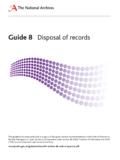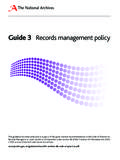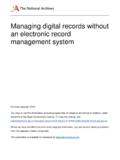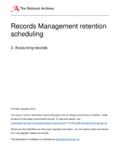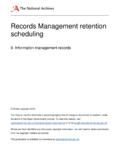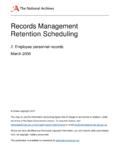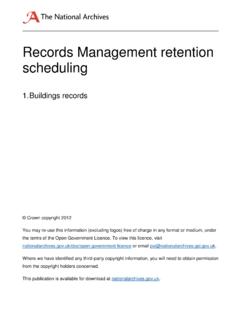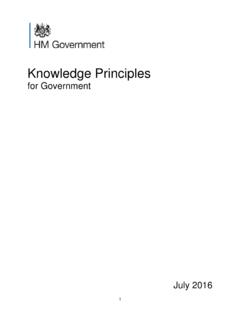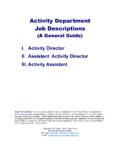Transcription of Guide 1 What is Records management? (2010)
1 This guidance has been produced in support of the good practice recommendations in the Code of Practice on Records management issued by the Lord Chancellor under section 46 of the Freedom of Information Act 2000. A PDF version of the full code can be found 1 what is Records management ?2 Last updated 31 August 2010 Who should read this guideThis Guide is written for people who have no background in Records and information management but find themselves responsible for it within their organisation, or have some other reason for acquiring a basic understanding of the subject.
2 what this Guide is aboutThis Guide is the first of a series of guides produced to support the good practice recommendations in the revised Code of Practice on Records management issued in July 2009 by the Lord Chancellor under section 46 of the Freedom of Information Act 2000 (from now on this Code of Practice will be referred to as the Code ). This Guide provides an introduction to the subject, explaining the term Records and why it is important to manage Records effectively. It is arranged in the following sections:1 what are Records ?2 Why are Records kept?
3 3 what is Records management ?4 Why does Records management matter?At the end there are references to some further guidance and a list of other guides in this that these guides do not apply to the management of archives, the small proportion of Records selected for permanent preservation and transferred to an archives service once they were no longer needed by the organisation for current business or legal reasons. Crown copyright 2010 The text in this document (excluding the Royal Arms and departmental or agency logos) may be reproduced free of charge in any format or medium providing that it is reproduced accurately and not used in a misleading context.
4 The material must be acknowledged as Crown copyright and the title of the document about any other use of this material, please write to The National Archives, Information Policy Team, Kew, Richmond, Surrey TW9 4DU or email updated 31 August 20101 what are Records ? Records are defined in the Code as follows: Information created, received and maintained as evidence and information by an organization or person, in pursuance of legal obligations or in the transaction of business .This definition is taken from the British Standard dealing with Records management , BS ISO 15489, published in 2000.
5 But what does the term mean in practice? This is explained in the rest of the section. An initial point to make is that Records can be in any format. As the Code says (at paragraph 2 of Part 1): The code applies to all Records irrespective of the technology used to create and store them or the type of information they contain. It includes, therefore, not only paper files series and digital Records management systems but also business and information systems (for example case management , finance, and geographical information systems) and the contents of websites. The Freedom of Information Act (FOIA) provides a right of access to information, not to Records , but also uses the term Records .
6 Does this mean they are two different things? There is a lot of debate among Records and information managers about what these terms mean and how they should be used. Some people regard Records as a subset of information with particular qualities that set Records apart from other information qualities such as structure, context and authenticity that come from the managed environment in which the Records are kept and that give them value as reliable evidence of past actions and decisions. Other people think that the widespread use of IT within organisations has led to erosion of the distinction between Records and information and use the terms series of guides does not adopt one approach over the other but uses the term Records because that is the term used in section 46 of the FOIA, under which the Code was issued.
7 If information has been created or received in connection with your organisation s work and is maintained as evidence and information by your organisation then it is likely to fall within the definition of Records quoted above, regardless of whether it is personal information, financial information or any other type of information. 2 Why are Records kept? Records are created not for the sake of it but to provide information about what happened, what was decided, and how to do things. Individuals cannot be expected or relied upon to remember or report on past policies, discussions, actions and decisions accurately all of the time.
8 So, as part of their daily work they keep a record by updating a register or database, writing a note of a meeting or telephone call, or filing a letter or email which ensures that they and their successors have something to refer to in the future. All organisations need to keep some Records . As the foreword to the Code puts it: Records and information are the lifeblood of any organisation. They are the basis on which decisions are made, services provided and policies developed and communicated. (Paragraph (v).)4 Last updated 31 August 2010 Records , if well-kept, are a reliable source of evidence and information.
9 Following the good practice set out in the Code and explained in the other implementation guides should ensure that Records are well-kept. 3 what is Records management ? Records management is about controlling Records within a comprehensive regime made up of policies, procedures, systems, processes and behaviours. Together they ensure that reliable evidence of actions and decisions is kept and remains available for reference and use when needed, and that the organisation benefits from effective management of one of its key assets, its management operates at different levels.
10 At a personal and local level it is about individuals keeping adequate Records of their daily work filing correspondence, policies and other key documents, managing their emails, keeping notes of meetings, and so on and doing so in such a way that the Records they keep can be found and used when needed, by themselves or others. (The concept of adequate Records is dealt with in Guide 4.) But Records management also operates at a more strategic level: a senior executive should be specifically responsible for Records management in the organisation decisions must be made about what Records should be kept and for how long they should be kept IT equipment and software for keeping and storing Records may need to be acquired and maintained staff need training and easy access to guidance access and disposal need to be managed and management involves a range of activities and tasks.
